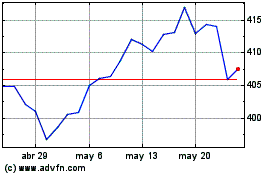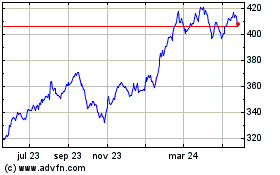Kraft Heinz Was a Classic Bet for Warren Buffet. Then It Soured.
24 Febrero 2019 - 12:38PM
Noticias Dow Jones
By Nicole Friedman
Kraft Heinz Co. was a classic Warren Buffett bet in many ways:
an easy-to-understand company stocked with iconic American
brands.
"This is my kind of transaction," the Omaha, Neb., billionaire
said during the 2015 merger of H.J. Heinz Co. and Kraft Foods Group
Inc., "uniting two world class organizations and delivering
shareholder value."
The abrupt decline of that value demonstrates that even Mr.
Buffett's long-successful investment philosophy is vulnerable to
sudden shifts in consumer taste.
Mr. Buffett's Berkshire Hathaway Inc. said Saturday it swung to
a $25.4 billion loss in the fourth quarter due to an unexpected
write-down last week at Kraft Heinz Co. and unrealized investment
losses. Berkshire owns 27% of Kraft Heinz.
Kraft Heinz's $15.4 billion write-down was an acknowledgment
that the Kraft and Oscar Meyer brands haven't performed as well as
expected. Consumer tastes are shifting toward healthier or
more-natural ingredients and away from processed foods.
Berkshire's fourth-quarter loss dragged down the conglomerate's
net earnings to $4 billion in 2018 from $44.9 billion the prior
year. Berkshire's operating earnings, which exclude impairments and
unrealized investment results, rose to a record $24.8 billion in
2018, up from $14.5 billion the prior year.
Mr. Buffett has long bet that strong consumer brands will help
companies maintain market share and pricing power. Some of his
biggest equity holdings, including Apple Inc. and Coca-Cola Co.,
are household names. Berkshire also owns a number of classic
American companies, including Dairy Queen, Geico, Duracell and
Fruit of the Loom.
"Kraft represented the classic Berkshire company...where you buy
the solid brands that have repeated and dependable cash flow, and
all is great," said Cathy Seifert, equity analyst at CFRA Research.
"It's valid to question what's the go-forward strategy."
Mr. Buffett didn't discuss Kraft Heinz in his annual letter to
shareholders released Saturday, but he acknowledged the challenges
facing the packaged-food business on CNBC in August.
"It's very hard to offer a significant premium for a
packaged-goods company and have it make financial sense," Mr.
Buffett said. "Branded packaged goods are a very, very, very good
business in terms of return on tangible assets. But they're not a
sensational business in terms of where you could be five or 10
years from now."
Mr. Buffett's big bet on the snack business started in 2013,
when Berkshire teamed up with Brazilian private-equity firm 3G
Capital to buy Heinz. Berkshire and 3G helped finance the merger
between Kraft and Heinz in 2015.
As Berkshire has grown, Mr. Buffett has come under increasing
pressure to spend its massive cash pile on acquisitions and
investments. Berkshire hasn't done a major deal in three years, and
Mr. Buffett has struggled to find reasonably priced large companies
to buy.
Berkshire's cash, which is mostly invested in Treasury bills,
grew to almost $112 billion at year-end, marking the sixth straight
quarter above $100 billion.
Mr. Buffett offered no specific guidance in his annual letter on
how he may use his growing pile of cash. He expects to move "much
of our excess liquidity into businesses that Berkshire will
permanently own" but prices are still too high, he wrote. "We
continue, nevertheless, to hope for an elephant-sized
acquisition."
Berkshire repurchased a bit over $400 million of its stock in
the fourth quarter, down from $928 million in buybacks in the third
quarter. Investors were hoping Berkshire would spend a significant
chunk of its cash buying back shares.
Some shareholders have questioned whether Berkshire will buy
more of Kraft Heinz now or acquire the entire thing. Berkshire
could also help finance future acquisitions by Kraft Heinz.
Berkshire valued its Kraft Heinz stake at $13.8 billion in 2018,
down from $17.6 billion the prior year. Berkshire's cost basis for
the investment was $9.8 billion.
Two Berkshire employees sit on Kraft Heinz's board: Greg Abel,
vice chairman for noninsurance business operations and one of two
candidates to succeed Mr. Buffett as chief executive, and Tracy
Britt Cool, CEO of Berkshire subsidiary Pampered Chef and Mr.
Buffett's former financial assistant. Mr. Buffett retired from the
Kraft Heinz board in April as he cut back on travel
commitments.
"I wouldn't want Warren Buffett to be allocating more capital
under the umbrella of Kraft Heinz and 3G," said David Rolfe, chief
investment officer of Wedgewood Partners Inc. in St. Louis, which
holds Berkshire shares. "I would much rather see Warren spend tens
of billions buying back his own stock."
Write to Nicole Friedman at nicole.friedman@wsj.com
(END) Dow Jones Newswires
February 24, 2019 13:23 ET (18:23 GMT)
Copyright (c) 2019 Dow Jones & Company, Inc.
Berkshire Hathaway (NYSE:BRK.B)
Gráfica de Acción Histórica
De Jun 2024 a Jul 2024

Berkshire Hathaway (NYSE:BRK.B)
Gráfica de Acción Histórica
De Jul 2023 a Jul 2024
